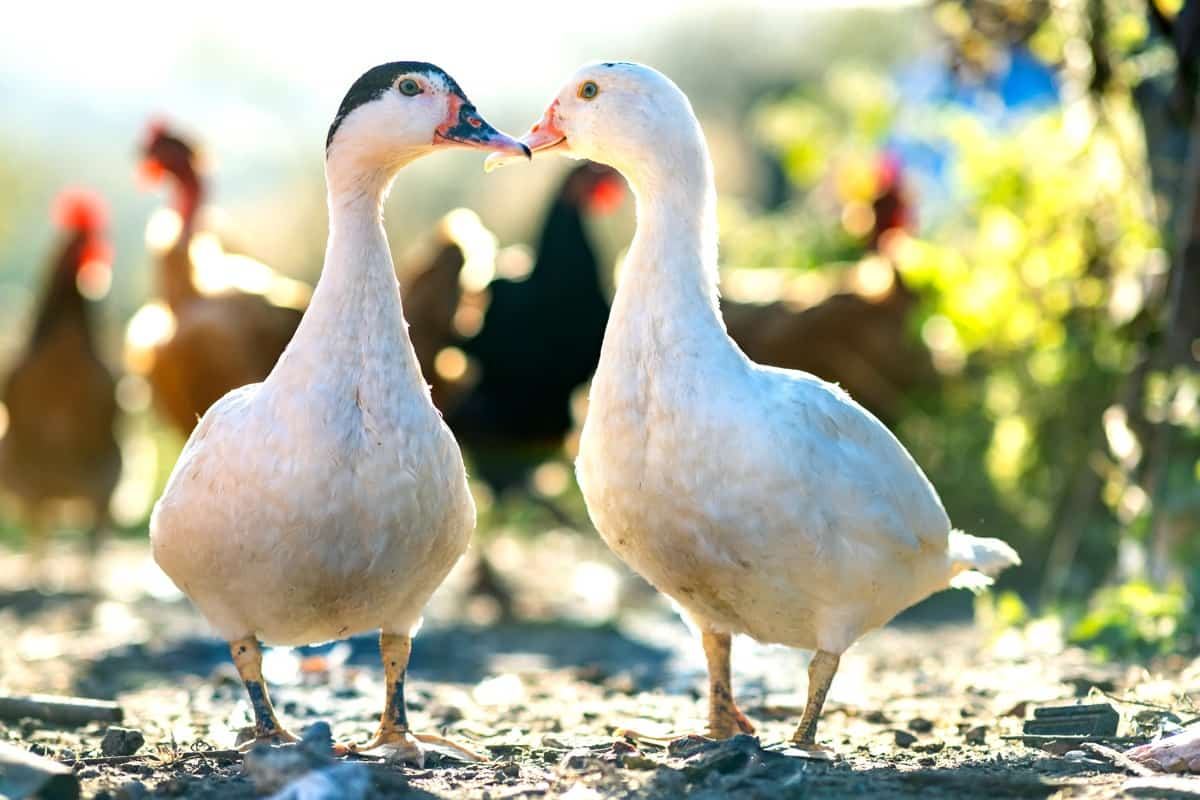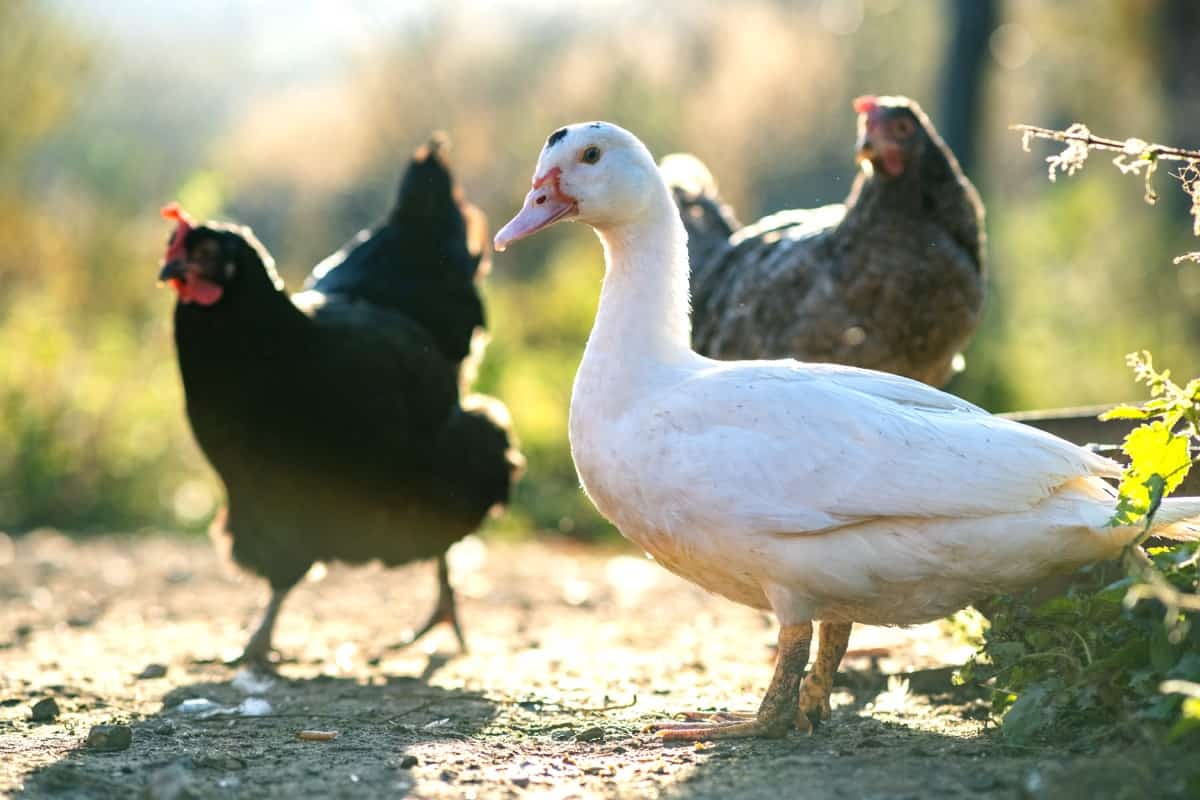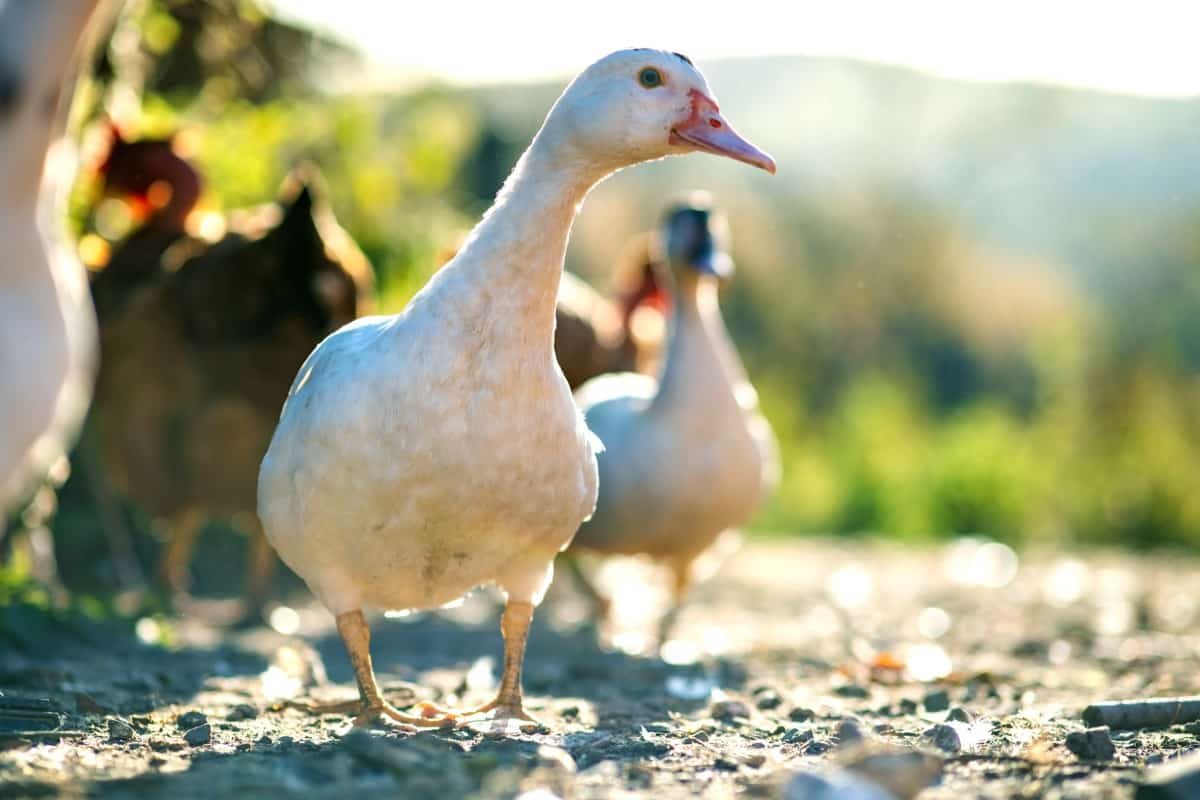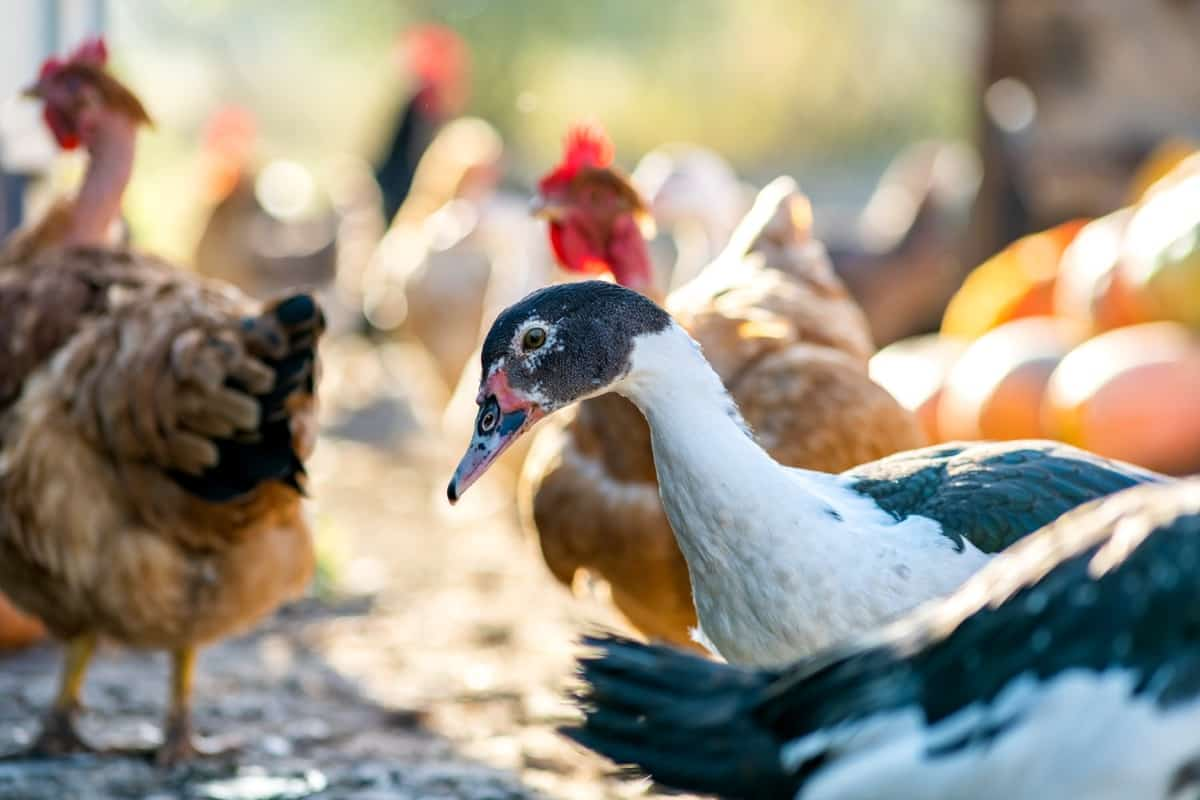Raising chickens and ducks together can be a rewarding experience, but you should know a few things before starting. There is no problem coexisting chickens and ducks in the same area, but they have different needs and behaviors that should be considered. This article aims to provide some tips to ensure the success of your poultry venture when raising chickens and ducks together.

Raising Chickens and Ducks Together
Duck Eggs Vs. Chicken Eggs – Size Comparison
Ducks and chickens both lay excellent eggs but differ in size and taste. Duck eggs are larger and have a richer flavor than chicken eggs, which are smaller and more commonly consumed. To determine the ratio of chickens to ducks in your flock, consider your household’s preferences and potential market demand.
Chickens and Ducks Have Different Water Needs
A duck is a natural waterfowl with specialized adaptations that enable it to survive in aquatic habitats. In addition to their webbed feet, they have waterproof feathers that keep them buoyant and well-insulated. Water is used by ducks for many purposes, including cleaning their feathers and searching for food. As opposed to ducks, chickens are primarily land-based birds and are not as comfortable in water.
While chickens need clean water for drinking, they don’t require as much water for bathing and swimming as ducks. In addition to having scaly feet, chickens have non-waterproof feathers, making it hard to stay afloat. To meet the specific needs of chickens and ducks, separate water sources should be provided. It is important that ducks have access to a larger body of water, such as a pond or a shallow pool, so they can swim and engage in their natural behaviors.
Keeping the water clean and regularly refreshing is important for preventing the growth of bacteria and parasites. The chickens’ drinking needs can be met with a small water trough or container. To promote health and well-being, the water should be clean and contaminant-free. Additionally, dust bathing may benefit chickens by keeping their feathers clean and deterring pests. Providing them with a designated dust bathing area can help satisfy their instincts.
Chicken and Duck Food
It is essential to provide chickens and ducks with a balanced diet that meets nutritional requirements. They can share some food items, but certain considerations must be considered. The diet of chickens and ducks should be rich in protein, carbohydrates, vitamins, and minerals. It is recommended that chickens consume a diet with a 16-18% protein content. You can achieve this by providing them with grains, seeds, legumes, and commercial poultry feed. Corn, wheat, barley, and soybean meal are common ingredients in chicken feed.
In contrast, ducks require more protein than chickens. The protein content of the diet should be between 20 and 22%. You can achieve this by feeding them grains, legumes, and aquatic plants. It is common for duck feed to contain fish or shrimp meal, which are excellent protein sources. Some food items can be shared between chickens and ducks, but certain items should be avoided.
In case you missed it: The Perfect Poultry Pair: Raising Turkeys and Chickens Together

It is important to prevent cross-contamination between chickens and ducks because chickens are more prone to contracting diseases from ducks, such as avian influenza. Disease spread can be minimized by keeping chickens and ducks in separate feeding areas. Furthermore, chickens and ducks require different diets. Ducks require a higher protein and fat diet than chickens, primarily seed and grain-eaters. Nutritional deficiencies and health problems can result from feeding them the wrong diet. For each species, it is important to provide appropriate feed.
The Coop for Chicken and Ducks
The ideal coop setup for chickens and ducks would look like two separate areas.
For Chickens
They prefer to roost at night since being higher off the ground makes them feel more secure. It is common for the two end birds to sleep with one eye open even inside their coop. Chickens need to enjoy their beautiful sleep at night so they do not move around at night. Until morning, they will remain on their perch.
For Ducks
Nesting on the floor is one of their favorite things to do. Large piles of bedding that are thoroughly wet frequently are preferred by ducks. They rarely sleep through the night – they will settle down and then wake up later to talk to their friends or move around a bit. As this happens several times a night, it can disrupt the chicken’s sleep. Therefore, it is best to have two separate coops.
If this is not possible, try partitioning the coop into wet and dry areas. In contrast, the chickens can remain dry and undisturbed, while the ducks can make a mess as they please. If your run is secure with wire under you, you could allow the ducks to sleep in the pen. However, you must be certain it is completely secure. Predators will attack your birds if you don’t take action. When chickens are let out in the morning, they can be let out through automatic coop doors.
Chicken and Ducks Behavior Concerns
In general, chickens and ducks are considered acquaintances rather than friends. In some cases, they may share the same space. They will probably go their separate ways during the day when given the chance. Ducks are less concerned about pecking orders than chickens. There may be a bit of a clash between the ducks before they move on. Chickens seemingly obsess over who is at the top.
In case you missed it: How to Raise Chicken and Quail Together: A Comprehensive Guide

Consequently, chickens are more aggressive toward each other than ducks. This can be dangerous when a duck isn’t interested in establishing a pecking order. A Chicken’s beak and talons are sharp and can damage a duck less equipped to battle with such a foe.
Roosters and Drakes
Keeping a rooster and drake together in the same flock is possible if they were raised together. Otherwise, they may become aggressive toward each other. This will all depend on the temperament of the two males. Keeping a drake without a rooster could be deadly to chicken hens due to the aggressive nature and anatomy of a drake. Drakes can easily injure a chicken hen; therefore, keeping a protective rooster would be beneficial. Typically, having enough hens around for everyone means less to fight about. The more, the merrier!
Health Issues
One of the health concerns when raising chickens and ducks together is the transmission of diseases. Chickens and ducks can carry different pathogens, such as bacteria, viruses, and parasites, which can harm each other. Therefore, it is crucial to implement proper biosecurity measures to reduce the disease transmission risk. One common disease that can affect both chickens and ducks is avian influenza, also known as bird flu.
In case you missed it: Top 10 Common Mistakes to Avoid in Turkey Farming

This highly contagious viral disease can cause severe illness and even death in poultry, spread by direct contact with the droppings of infected birds. To prevent the spread of avian influenza, it is recommended to keep chickens and ducks separate from each other and to regularly clean and disinfect their living areas.
Another health issue is the potential for parasites, such as lice and mites, to infest chickens and ducks. These parasites can cause irritation, stress, and decreased egg production in poultry. Regular inspection and treatment for parasites are essential to keep your birds healthy.
Conclusion
You can raise chickens and ducks together by considering these key aspects and implementing appropriate measures. Keeping chickens and ducks together in your backyard or farm is a unique experience that can be enjoyed with proper planning and care.
- Feed Your Flock for Less: Top 10 Tips to Save on Chicken Feed
- Ultimate Guide to Ossabaw Island Hog: Breeding, Raising, Diet, and Care
- Hatching Answers: The Top 10 Reasons Your Chickens Aren’t Laying Eggs
- Eggs and Economics: Breaking Down the Cost of Raising Backyard Chickens
- Defend Your Greens: Proven Methods to Keep Iguanas Out of Your Garden
- Ultimate Guide to Cinnamon Queen Chicken: A Comprehensive Guide for Beginners
- Ultimate Guide to California Tan Chicken: Breeding, Raising, Diet, Egg-Production and Care
- Ultimate Guide to Marsh Daisy Chicken: Breeding, Raising, Diet, and Care
- 10 Types of Chicken Farming Businesses You Can Start for Profits